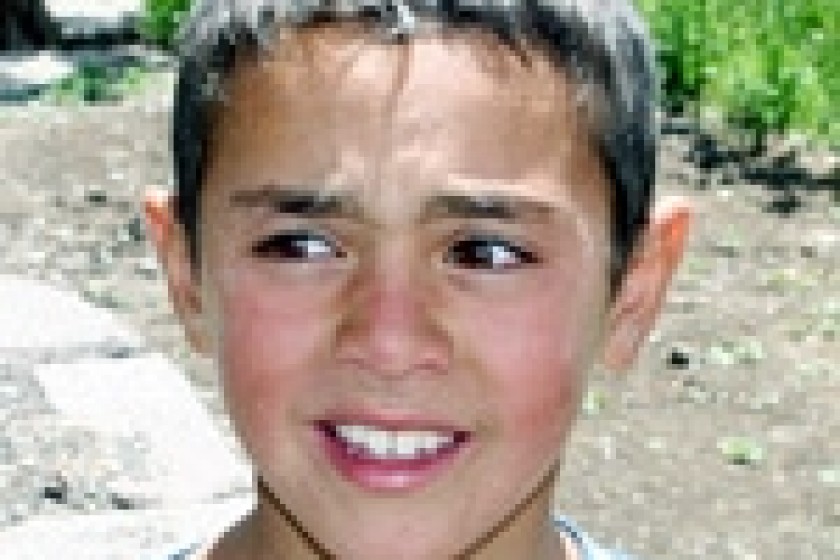
The Region of Shirak is the Poorest in Armenia Despite What Official Statistics Show
What’s nutrition?
Robert Ghambaryan.
Do you attend school?
I attend the second grade.
Which is your house? Which house is your parents’?
No. My mother went to the city, Gyumri, with her brother. My father...I don’t remember him, he’s in Russia.
There are many other who share the fate of 8 year-old Robert from the village of Shirakavan in the Shirak Marz. Most of the men folk have left to find work aboard, mainly in Russia. According to Village Mayor Gevorg Harutyunyan a relatively large number have left this year. The Mayor says that most return in the winter for a month or two but that others stay away for years on end.
The Mayor ponders that, “Perhaps there work isn’t going well and they don’t have the means to return. Or maybe they’d rather send the money they would have spent on a ticket to their family here.” The
Senik Baloyan, a village resident, complains that, “This really isn’t a village, it’s an illusion. For 25 years the place hasn’t looked anything like a community in which to live. In the old village we had irrigation water and cultivated our family garden plots. We had certain assets. To get really good quality drinking water all we had to do was to dig down some 4-6 meters. Here, after the collapse of the
Mayor Harutyunyan explains that, “The potable water is circulated through the means of an electric pump and the village doesn’t have water meters. If we supplied water throughout the day the residents would run it to their fields. This would increase the overall water usage and we’re not in a position to pay for the increase.” He claims that the irrigation water problem will be resolved in the coming one to two years. “The Millennium Challenge project envisages that 7-8 settlements, including Shirakavan, will be provided with free-flowing irrigation water from the Kapsi reservoir.”
The Mayor adds that, “People are tired of waiting and don’t believe anything any more. Due to the lack of water the villagers have been turned into consumers, rather than the producers they once were. But conditions are so bad that it’s a miracle if one out of every ten residents actually purchases something when the merchants ply their wares here. Most just stand around and watch.”
Animal husbandry isn’t well developed in the village. The tillable land allocated to the residents after independence was gained is some 45 kilometers from the village, on the other side of the gates lining the border with
Village resident Misha Galstyan notes that, “The farmers plant wheat and barley but the harvest is reduced by half since the crops aren’t watered. On the other hand, costs go up given that the lands are so far removed. For every piece of heavy equipment used a villager must recompense the driver for 60 liters of diesel fuel. Even after all these problems border troops don’t allow the residents from crossing over to these field at least 2-3 times per month, arguing that their higher-ups are planning an inspection or that an incident has been registered in the area. In other words there comes a point where costs involved outstrip any possible profit. This is why many have given up cultivating their lands.”
Today, 234 families reside in Shirakavan. During the last decade some 30 have left the village. The rate of the exodus is reflected in the change in the number of students. Ten years ago there were 180 attending class while today this figure has dropped to 130.
Mnatsakan Petrosyan states, “80% of the young people have left. Most of the boys leave the village after completing military service because there’s work for them here. All 4 of Mr. Petrosyan’s sons have traveled abroad to find work and two of them have relocated their families to
Karo Yeranosyan, another Shirakavan resident, complains, “The grandfather of former Armenian Prime Minister Antranik Margaryan used to live in the neighboring village. That village was supplied with gas. But we don’t have gas since the pipeline runs alongside our village.”
Mr. Baloyan adds that, “They brought pipes to the village just before the presidential elections claiming that if we voted for their candidate (Serzh Sargsyan - A.T.) we’d get the gas. We voted for the man but we got the short end of the stick. The gas never arrived. What kind of a situation is this? It’s total chaos.”
Mayor Harutyunyan, who belongs to the ruling Republican Party, states that, “Not only will Shirakavan be supplied with gas this year but the school building, now in a state of disrepair, will be renovated with financing from the State Insurance Fund. All the preparatory accounting and planning work has been completed and construction work should begin by next March. It’s only some minor financial issues that are holding up the project.” The Mayor assuredly states that most of the village’s major problems will be resolved over the next few years.
However, the village residents we spoke with didn’t share the Mayor’s optimism. Residents were quick to point out that they were paid attention to at election time. It is also interesting to not that none of the residents we spoke with knew the name of Mkhitar Varagyan, their elected Deputy in the National Assembly. “We never seen the man’s face, how do you expect us to know who he is?” they responded, stating that they don’t expect much from their “elected representatives”.
The Shirak Marz is one of the poorest districts in
 Videos
Videos Photos
Photos




Write a comment